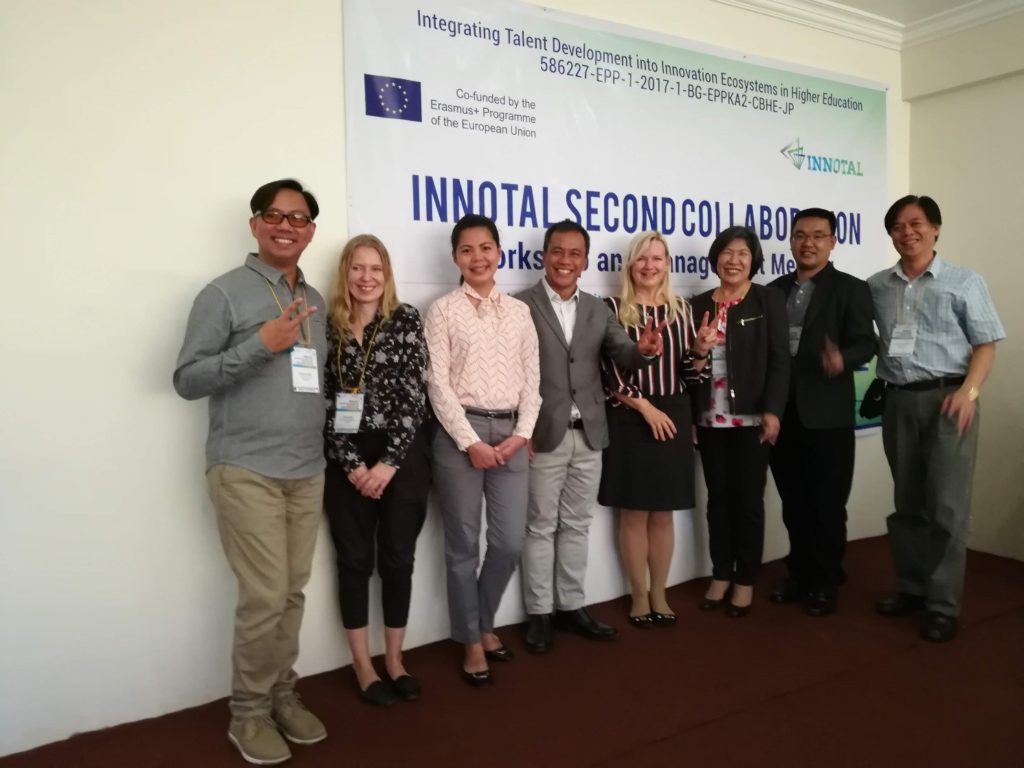Major themes for Muova’s international projects include building competences, employability, innovation, sustainability, entrepreneurship, soft-skills, promoting and teaching creativity, and supporting the creative sector. Muova’s educational projects boost creativity and entrepreneurial skillsets. Much of the training focuses on soft skills to complement academic or technical training.
One of Muova’s main areas of focus is on the development of entrepreneurial skills. Muova’s projects help aspiring entrepreneurs in two directions. One to develop the soft skills to help them pursue their goals and the other to generate ideas and think through the entire business process. User-participants learn to use customer-centric service design methods and other elements of design thinking including how to utilize the persona of entrepreneur in formulating their brand identity. The focus on soft-skills builds creativity, self-confidence, self-efficacy and resilience; all characteristics that increase innovation, diversification and sustainability.
This bridges a gap locally by providing training tools to help entrepreneurs define, prototype, test and refine their ideas before they approach a business incubator or other business development organisation for help getting their ideas and business plans off the ground. Several local organisations exist to help entrepreneurs once they have business idea such as Startia and VASEK. Muova’s projects offer training tools to develop entrepreneurial competences so that aspiring entrepreneurs can generate ideas that they will then go through the process of testing and refining.
The cultural and creative sector (CCS) is small in the Ostrobothnia region where energy and other sectors are more prominent. Muova’s projects meet a need for SME CCS enterprises by helping creatives to become entrepreneurs and to innovate. Innovation is one of the great strengths of the CCS and can add value to the wider economy along with diversifying the labour pool and adding sustainability. The current CRAFTS CODE project moves Muova’s commitment to the sector into the realm of influencing policy. The project aims to increase capacity and sustainability, as well as innovation, in the CCS sector.
Muova also partners in projects to boost creativity in HEIs (higher education institutions) and to help graduates of HEIs develop creativity and other soft skills that will help them to excel. Citing a gap in what employers need from employees and what students learn in their schooling, projects such as InnCREA and Reboot give individuals and institutions tools for today and the future to innovate and adapt to face challenges and uncertainty.
Relatedly, a current project, ParENTrepreneurs, takes a foundational approach to developing the skills that will help individuals in life and in employment. ParENTrepreneurs recognizes the role parents and other care-givers have in helping their children to develop skills and gives parents tools to become more self-aware in how they parent and to support their children in developing creativity, problem-solving, motivation, perseverance, resilience, the ability to cope with uncertainty and other life-skills.
Another common factor in Muova’s international projects is the creation of tools that are free and accessible on online platforms. These are EU-funded projects that aspire to offer support to individuals, organisations, HEIs, businesses, and the public bodies throughout Europe. With these sustainable toolkits, trainings and self-assessments, Muova contributes locally, nationally and internationally. Muova is a partner in creating benchmarks for good and best practices in the EU and shaping the culture and workforce of the future.
Support for the creative class
BusinessMuovain, created for the Creve 2.0 project, and used by West Coast Startup (a VAMK & University of Vaasa incubator), is a CRAFTS CODE good practice aimed at the creative sector and an example of Muova’s innovation and expertise. The creative sector is underserved in Ostrobothnia. As such, and by its creative nature, it is an area for innovation and growth. With BusinessMuovain, creative entrepreneurs can use lean startup methodology and design thinking in a process of ongoing adaptation that allows for seeing from different perspectives and the potential to solve blurry and wicked problems.
Common business development tools do not adapt well to the creative sector. The creative sector needs tools targeted specifically to its unique qualities. The BusinessMuovain tool helps aspiring creative sector entrepreneurs to explore feasibility, viability and attractiveness of business ideas, profitability of business activities, and the development of functional business models. It speaks the same language as those in creative fields which makes it a valuable and tool for encouraging more entrepreneurial activities.
ServiceDigiCult will similarly align itself with the unique needs and communication style of the CCS, while CRAFTS CODE looks to solutions at a policy level that will support the sector and its long-range viability and potential for growth and innovation.
On the forefront of innovation in higher education
In the EUSRexcel project, Muova takes a lead role in creating benchmarks for European HEIs to measure their level of social responsibility. Outputs for the project include an online self-assessment for HEIs as a first step in the evaluation process. HEIs that meet certain criteria will then be awarded an EU-wide certification.
The InnCREA project will present HEIs with tools to teach creativity throughout their programs. Creativity is among the highly-valued skills that employers would like and that is not widely incorporated in HEI teaching across the board. This innovative project will increase the value and diversity of skills that students graduate with and take into their work lives.

Learn more about the projects:
- Muova´s website
- Towards a European Social Responsibility Excellence Award
- Parentpreneurs project website
- Inn-Crea project website
- Craftscode project website
Disclaimer: The European Commission support for the production of this publication does not constitute an endorsement of the contents which reflects the views only of the authors, and the Commission cannot be held responsible for any use which may be made of the information contained therein.




